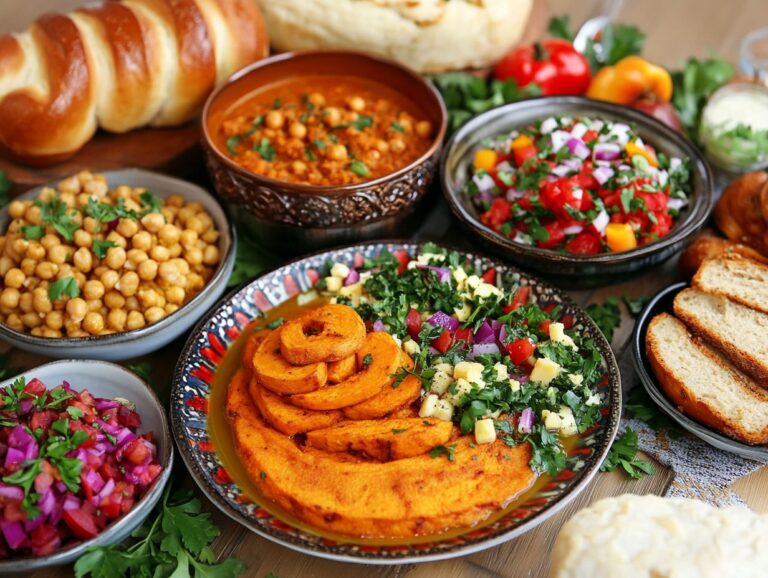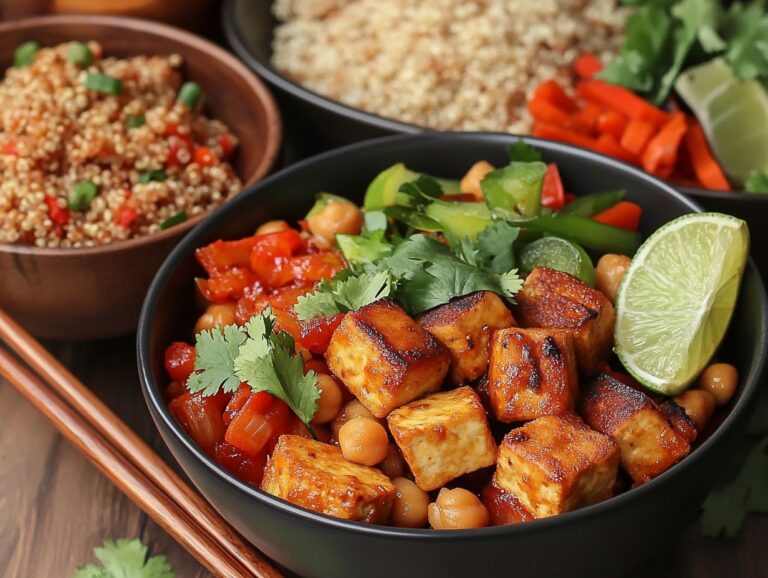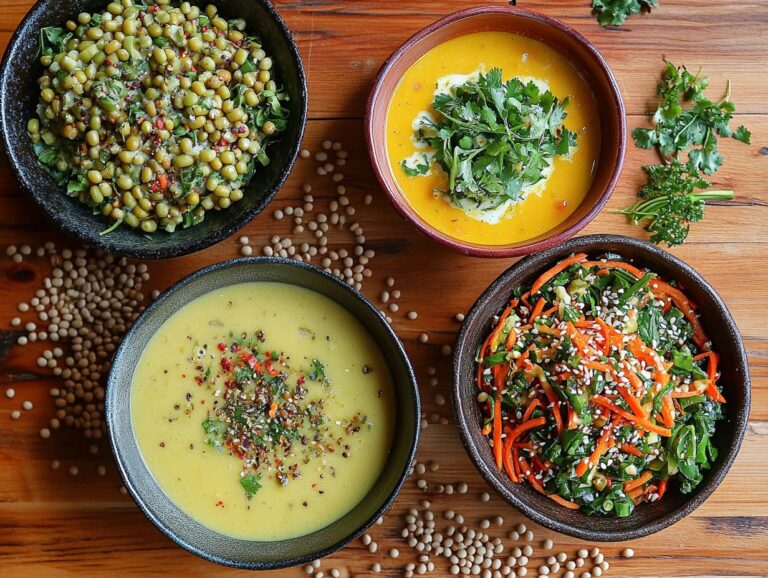In a world where dietary choices reflect personal values and health priorities, kosher and vegan diets stand out due to their unique principles and benefits. This article explores the foundations of these two lifestyles, examining what makes a diet kosher or vegan while highlighting the advantages of combining them. From essential pantry staples to delicious recipes and practical tips for maintaining a kosher vegan lifestyle, you will discover innovative ways to enjoy flavorful, plant-based meals that align with your ethical and health goals. Whether you are an experienced cook or just starting out, there is something here for everyone!
Understanding Kosher and Vegan Diets
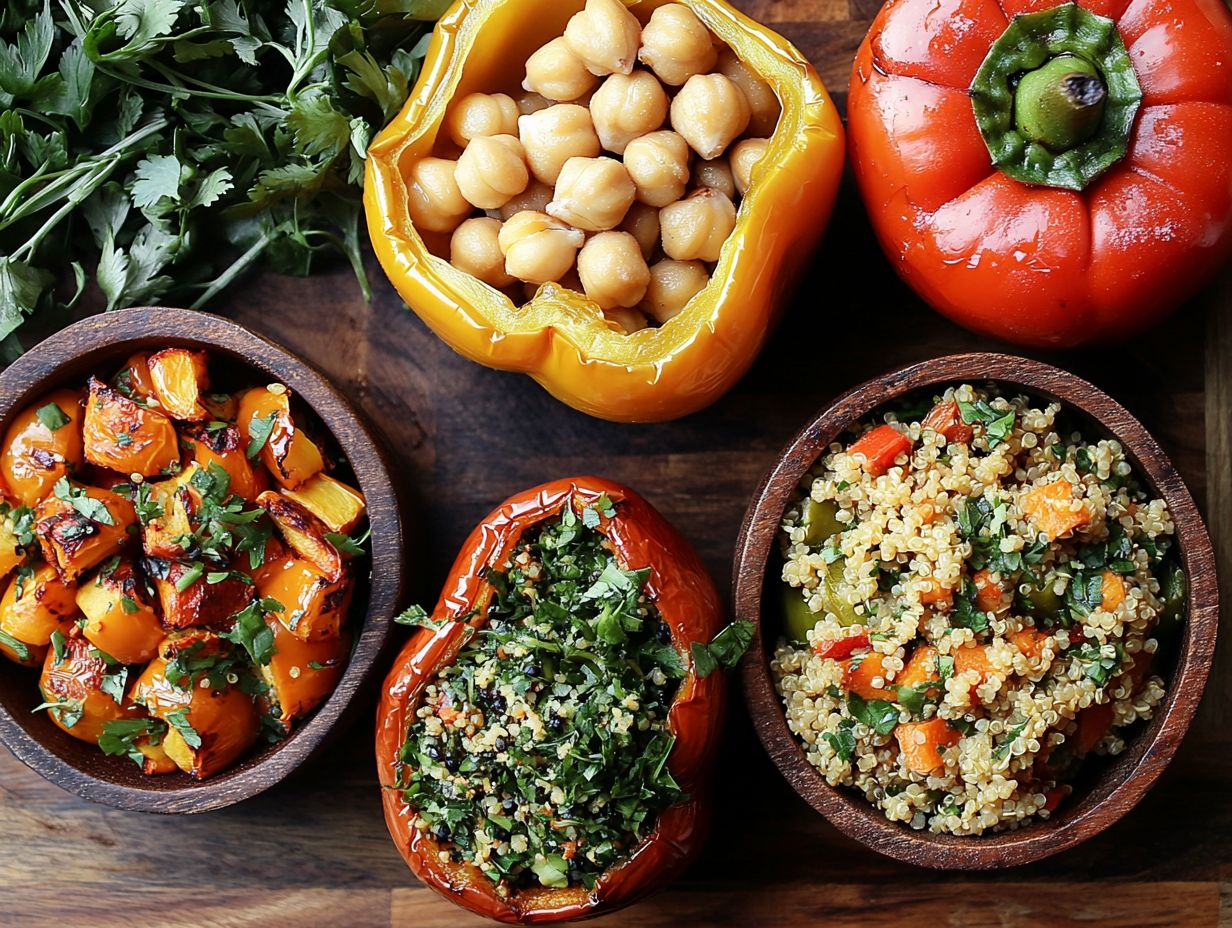
Kosher and vegan diets are two distinct culinary practices that emphasize health, ethical eating, and sustainability in their ingredient choices.
Kosher adheres to Jewish dietary laws that require the selection of ingredients meeting specific religious standards. In contrast, veganism excludes all animal-derived products.
Both diets cater to different dietary restrictions while promoting overall well-being, contributing to their growing popularity in modern society.
By combining kosher and vegan practices, one can create a diverse array of healthy, ethical, and sustainable dietary options that cater to various tastes and lifestyles.
What Makes a Diet Kosher or Vegan?
A kosher diet adheres to Jewish dietary laws known as Kashrut, which dictate specific food pairings and outline which animals are permissible to eat. In contrast, a vegan diet excludes all animal products and is entirely plant-based.
Each diet has its own set of rules that determine what is allowed and what is not. The kosher guidelines specify the species of animals that can be consumed, the methods of slaughter, and prohibit the mixing of dairy and meat. Conversely, vegans avoid any ingredients derived from animals for ethical and compassionate reasons.
Both diets emphasize the importance of mindful eating and encourage individuals to consider the source of their food. These dietary rules not only influence personal eating habits but also shape food culture, inspiring people to be more aware and innovative in preparing dishes that align with these ethical principles, ultimately contributing to a vibrant food culture.
Benefits of Combining Kosher and Vegan Eating
The benefits of kosher and vegan eating encompass health, ethical considerations, and environmental sustainability, while also enabling the creation of a diverse range of delicious dishes that cater to various tastes and dietary needs.
By combining these two diets, individuals can prepare meals that are both nutritious and aligned with ethical concerns regarding food sourcing and consumption. This fusion allows for innovative recipes that are both healthy and flavorful.
Additionally, the combination promotes the use of organic, seasonal, and local ingredients, which enhance nutritional value and flavor, ultimately benefiting both physical and mental health.
Health and Ethical Considerations
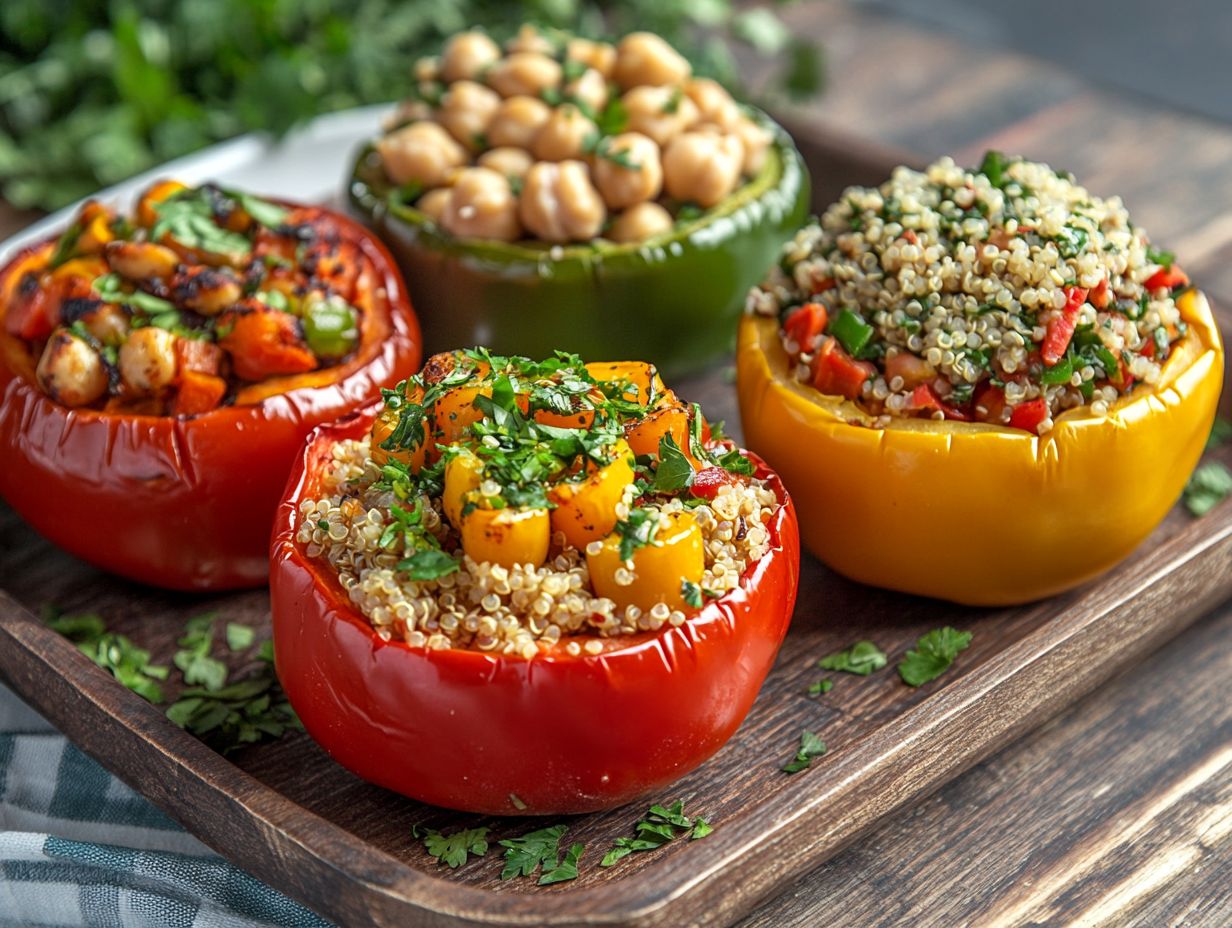
Kosher veganism combines the principles of kosher and vegan diets, making it one of the healthiest and most ethical dietary choices available. This diet is characterized by high nutrient density and incorporates healthy practices along with ethical considerations from both diets.
It adheres to dietary restrictions, fulfills religious requirements, and minimizes harm to animals and the environment. The kosher vegan diet prioritizes nutrient density by promoting the consumption of whole, plant-based foods that are rich in vitamins, minerals, and antioxidants.
This dietary pattern enhances microbiome health, which is essential for optimal digestive function. Furthermore, by eliminating animal products, individuals often increase their fiber intake, which supports gut health and aids in digestion.
Kosher Vegan Pantry Staples
The ingredients found in a kosher vegan pantry are essential for preparing a diverse range of dishes that are both healthy and flavorful, adhering to both kosher dietary laws and vegan principles.
Staples such as legumes, grains, spices, and fresh vegetables enable home cooks to create everything from appetizers to desserts. These ingredients not only comply with kosher dietary guidelines but also support a plant-based lifestyle.
By incorporating them into meal preparation, cooks can make the process easier and more enjoyable while promoting healthy and ethical eating.
Essential Ingredients for Flavorful Dishes
The essential ingredients for flavoring kosher vegan food include a variety of spices, herbs, and fresh vegetables that enhance both the flavor and health aspects of the meals.
Spices such as cumin, smoked paprika, and turmeric contribute flavor and color, while herbs like fresh cilantro and basil add brightness and warmth. Vibrant fresh vegetables, including bell peppers, zucchini, and leafy greens, provide natural sweetness and crunch that enhance the dish’s texture.
These ingredients can be incorporated through various cooking methods—such as roasting, grilling, or sautéing—to elevate the dish and increase enjoyment. For instance, a simple grain bowl can be transformed into a gourmet meal with a mix of roasted vegetables tossed in za’atar.
Experimenting with different flavors not only enhances the enjoyment of kosher vegan cuisine but also showcases the inherent versatility of kosher vegan cooking.
Easy Kosher Vegan Recipes to Try
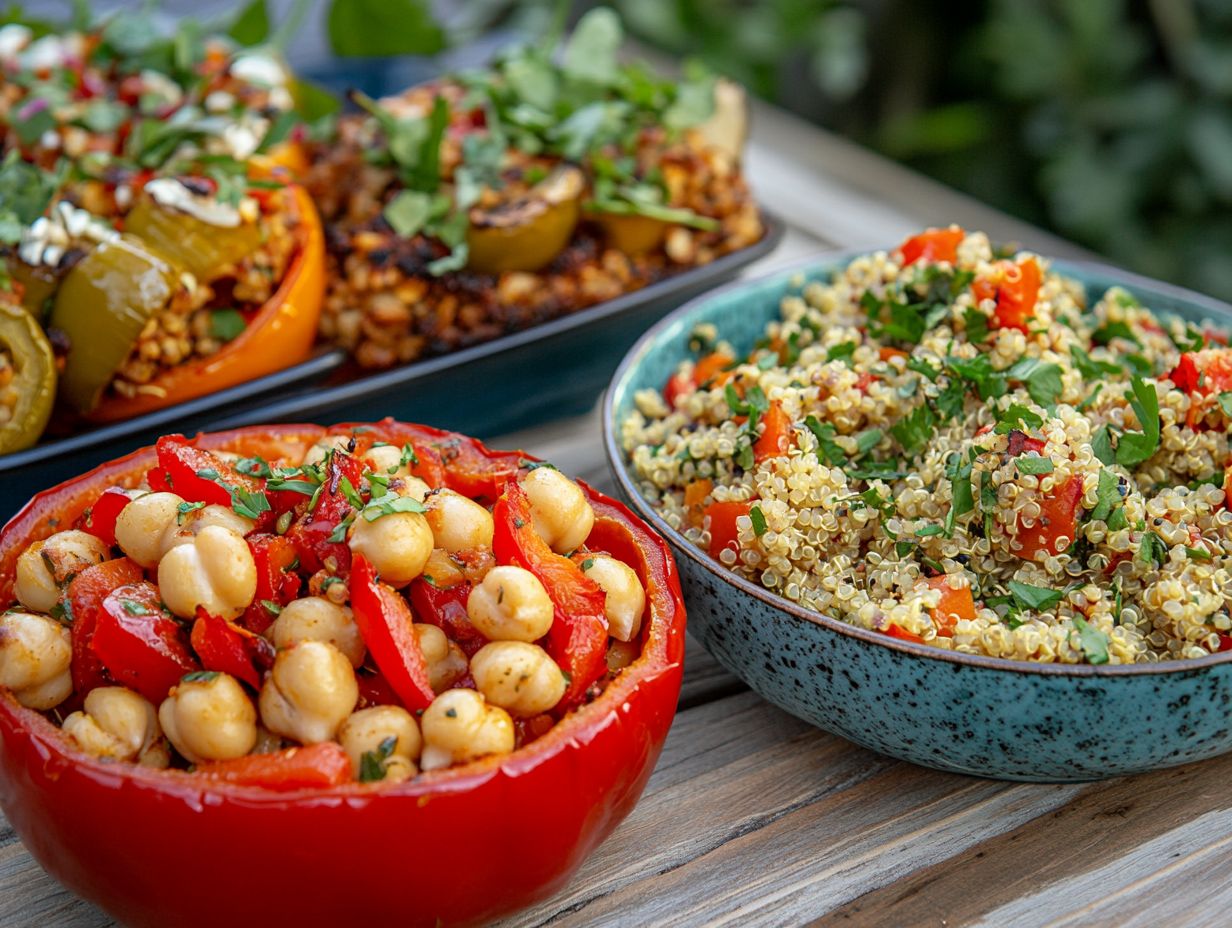
Simple kosher vegan recipes offer easy meal ideas that cater to a variety of tastes and dietary needs, while also fostering a love for plant-based food by simplifying the cooking process.
From beloved comfort foods like mac and cheese to refreshing salads and hearty soups, these recipes highlight the diversity of kosher vegan cuisine, enabling home cooks to create satisfying meals for any occasion.
By emphasizing straightforward cooking methods and readily available ingredients, simple kosher vegan recipes enable anyone to prepare delicious, healthy meals that the entire family will enjoy.
Simple and Delicious Meal Ideas
Simple and delicious meal ideas for kosher vegan cooking utilize a few key ingredients to highlight the natural flavors of plant-based foods while adhering to dietary restrictions. These meal ideas often feature lentils, quinoa, chickpeas, and a variety of fresh vegetables.
Dishes that boast simple yet flavorful profiles typically have enticing aromas and high nutritional value. Various cooking methods, such as sautéing, roasting, and steaming, can be employed to create a range of textures and colors in these meals.
Examples of satisfying kosher vegan dishes include:
- lentil stew
- quinoa salad
- other similarly simple yet delectable options
The beauty of these meals lies in their simplicity.
Tips for Maintaining a Kosher Vegan Lifestyle
Practical advice and effective meal planning strategies enable individuals to maintain a kosher vegan lifestyle while enjoying a diverse and fulfilling diet.
By understanding the principles of kosher eating and the fundamentals of vegan nutrition, individuals can more easily navigate their grocery lists, meal preparation, and cooking methods.
Adopting a kosher vegan lifestyle not only promotes health and wellness but also fosters a greater appreciation for the culinary arts through the exploration of diverse cuisines and flavors.
Practical Advice for Everyday Eating
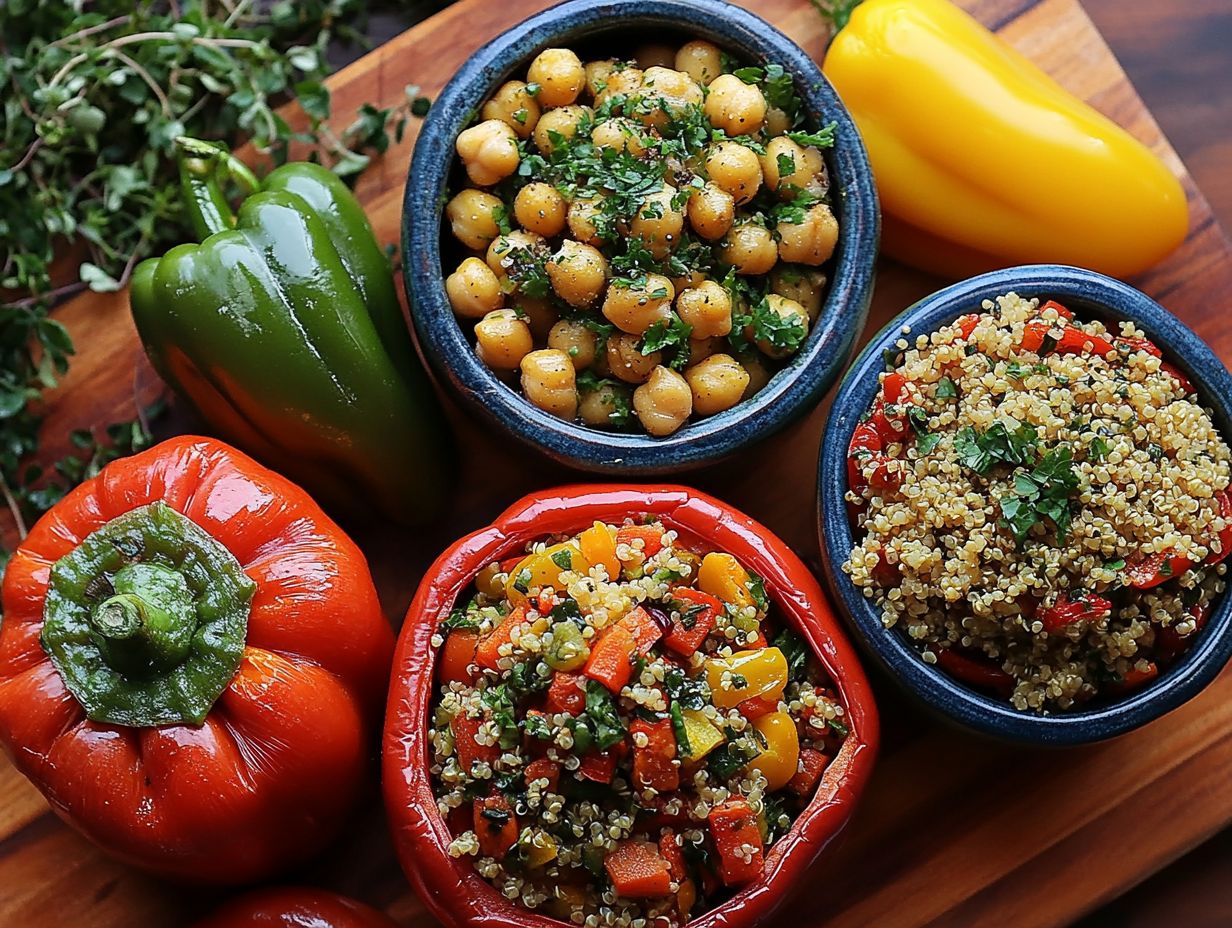
Practical advice for everyday eating within a kosher vegan framework includes tips on meal preparation, grocery shopping, and recipe adaptation that simplify the cooking process while ensuring adherence to dietary guidelines.
By utilizing common pantry staples such as legumes, grains, and a variety of vegetables, anyone can efficiently create diverse meals without overspending.
One effective strategy is to batch cook grains or legumes at the beginning of the week, allowing for easy incorporation into salads, soups, or stir-fries for quick meals.
Recipes that allow for substitutions can be transformative; for instance, replacing traditional dairy ingredients with plant-based alternatives enhances versatility.
Additionally, using seasonal and local produce not only reduces costs but also guarantees freshness, making kosher vegan meal preparation both affordable and delicious.
Exploring the Intersection of Kosher and Vegan Cuisine
The intersection of kosher and vegan cuisine offers a blend of innovative dishes and flavors, showcasing the art of plant-based cooking and food culture. This fusion highlights the adaptability of both dietary practices and fosters creativity in the kitchen.
Chefs and home cooks are inspired to experiment with ingredients and culinary techniques from various cultures. By adhering to the principles of kosher and vegan diets, culinary enthusiasts can craft unique dishes that honor their cultural traditions while accommodating contemporary tastes and dietary restrictions.
Innovative and Creative Dish Ideas
Innovative and creative dish ideas within the kosher vegan category feature reimagined traditional recipes that adhere to dietary guidelines while bursting with flavor.
Examples include:
- Quinoa-stuffed bell peppers infused with spices reflective of their country of origin
- Cashew-based Alfredo sauces served with zucchini noodles (zoodles)
- Eggplant and chickpea curries
- Richly flavored vegetable tagines or soups
Seasonal vegetables and bold herbs are often highlighted, emphasizing the importance of sustainable cooking practices across all levels of society.
Techniques and ingredients that align with current culinary trends include fermentation for dips and spreads, as well as the creation of plant-based cheeses, incorporating legumes and grains for nutritious meals. Additionally, culinary techniques such as using herbs and spices enhance the flavor profiles of these vegan dishes.
These trends showcase a desire to make kosher vegan cooking an even more vibrant, diverse, and exciting experience, catering not only to dietary restrictions and the vegan lifestyle but also to the growing demand for innovative and environmentally conscious meals. By incorporating seasonal produce and plant proteins like tofu and tempeh, these flavorful dishes meet the needs of ethical eating and sustainable food practices.
